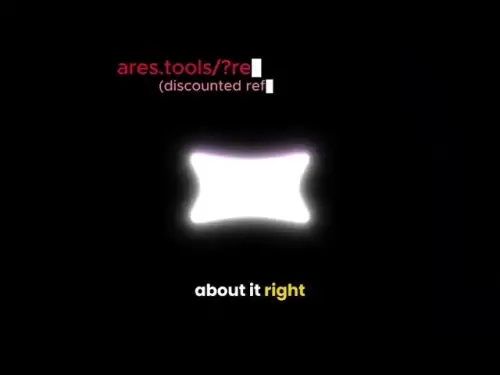-
 Bitcoin
Bitcoin $117300
-1.11% -
 Ethereum
Ethereum $3722
0.05% -
 XRP
XRP $3.144
-2.04% -
 Tether USDt
Tether USDt $1.000
-0.06% -
 BNB
BNB $780.0
0.13% -
 Solana
Solana $184.9
-1.51% -
 USDC
USDC $0.9998
-0.03% -
 Dogecoin
Dogecoin $0.2349
-0.94% -
 TRON
TRON $0.3145
0.01% -
 Cardano
Cardano $0.8143
-0.40% -
 Hyperliquid
Hyperliquid $43.34
1.43% -
 Sui
Sui $3.966
4.43% -
 Stellar
Stellar $0.4301
-0.30% -
 Chainlink
Chainlink $18.24
-0.02% -
 Hedera
Hedera $0.2604
7.17% -
 Bitcoin Cash
Bitcoin Cash $549.4
6.63% -
 Avalanche
Avalanche $23.98
-0.25% -
 Litecoin
Litecoin $113.3
-0.18% -
 UNUS SED LEO
UNUS SED LEO $8.972
-0.07% -
 Shiba Inu
Shiba Inu $0.00001397
1.28% -
 Toncoin
Toncoin $3.169
0.33% -
 Ethena USDe
Ethena USDe $1.001
-0.05% -
 Polkadot
Polkadot $4.084
0.64% -
 Uniswap
Uniswap $10.37
0.32% -
 Monero
Monero $320.5
-1.82% -
 Dai
Dai $0.9999
-0.02% -
 Bitget Token
Bitget Token $4.531
-2.43% -
 Pepe
Pepe $0.00001251
-1.42% -
 Aave
Aave $293.5
0.19% -
 Cronos
Cronos $0.1301
2.67%
Bitcoin Bergbaurisiko und Renditeanalyse: Wie kann die Wahrscheinlichkeit des Verlusts reduziert werden?
Bitcoin Mining bietet hohe Renditen, ist jedoch mit Risiken wie Hardwarekosten, Stromausgaben und Marktvolatilität ausgestattet. Strategien wie das Beitritt von Pools und die Verwendung effizienter Hardware können diese mildern.
Jun 08, 2025 at 10:50 pm
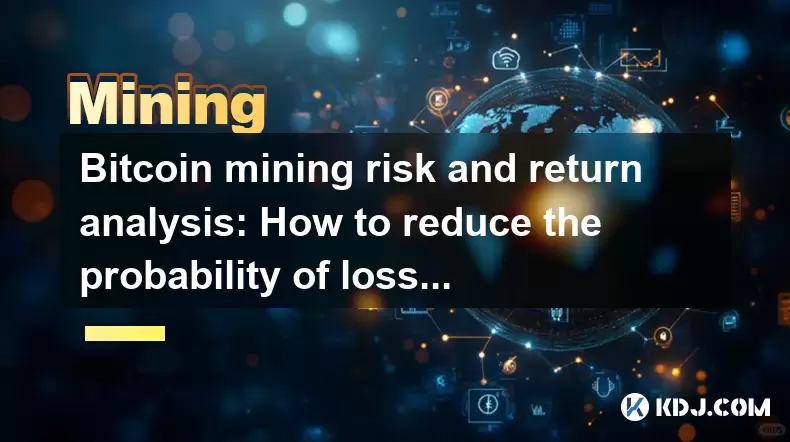
Bitcoin Der Bergbau ist zu einem immer beliebteren Unternehmen innerhalb des Kryptowährungsraums geworden, das durch das Potenzial für hohe Renditen zurückzuführen ist. Wie bei jeder Investition kommt es jedoch mit eigenen Risiken. Das Verständnis dieser Risiken und das Lernen, wie man sie mindert, ist für jeden von entscheidender Bedeutung, wenn man in die Einreise in die Bergbauindustrie in Betracht zieht. Dieser Artikel wird sich mit dem Risiko und der Rendite der Analyse des Bitcoin -Bergings befassen und Strategien zur Verringerung der Verlustwahrscheinlichkeit bereitstellen.
Verständnis Bitcoin Bergbau
Bitcoin Mining ist der Prozess, durch den neue bitcoin in Zirkulation eingeführt und Transaktionen überprüft und zur Blockchain hinzugefügt werden. Bergleute verwenden spezielle Computerhardware, um komplexe mathematische Probleme zu lösen, und im Gegenzug werden sie mit bitcoin s belohnt. Der Prozess ist wettbewerbsfähig, und die Schwierigkeit der Probleme passt regelmäßig an, um sicherzustellen, dass eine stetige Rate neuer bitcoin zum Angebot hinzugefügt wird.
Risiken, die am Bitcoin -Berging beteiligt sind
Es gibt mehrere Risiken, die mit Bitcoin -Berging verbunden sind, von denen potenzielle Bergleute sich bewusst sein sollten. Dazu gehören:
Hardwarekosten und Abschreibungen : Die anfängliche Investition in Bergbau -Hardware kann erheblich sein. Darüber hinaus bedeutet der schnelle Fortschritt in der Technologie, dass Bergbaugeräte schnell veraltet werden können, was zu Abschreibungen führt.
Stromkosten : Der Bergbau verbraucht eine erhebliche Menge an Strom. Abhängig vom Standort und den Stromkosten kann dies die Rentabilität des Bergbaubetriebs erheblich beeinflussen.
Regulierungsrisiken : Der rechtliche Status von Bitcoin und der Mining variieren je nach Land. Änderungen der Vorschriften können die Fähigkeit zur Mine oder den Wert von abgebildetem bitcoin s beeinflussen.
Marktvolatilität : Der Preis von Bitcoin kann sehr volatil sein, was den Wert der Bergbaubelohnungen direkt beeinflusst. Ein Rückgang des Preises von Bitcoin kann einen profitablen Betrieb in eine Verlustverlust verwandeln.
Betriebsrisiken : Dazu gehören Hardwareausfälle, Diebstahl und Cybersicherheitsbedrohungen. Bergbauvorgänge erfordern eine ständige Überwachung und Wartung, um sicherzustellen, dass sie reibungslos laufen.
Kehrt vom Bitcoin -Berging zurück
Die primäre Rückkehr aus dem Bergbau von Bitcoin ist die Blockbelohnung , die die Anzahl der an den Bergmann vergebenen bitcoin ist, der der Blockchain erfolgreich einen Block hinzufügt. Darüber hinaus verdienen Bergleute Transaktionsgebühren aus den in dem Block enthaltenen Transaktionen. Die Gesamtrendite aus dem Bergbau hängt von mehreren Faktoren ab, einschließlich des Preises von Bitcoin, der Effizienz der Bergbauhardware und den Stromkosten.
Strategien zur Verringerung der Verlustwahrscheinlichkeit
Um die mit Bitcoin -Berging verbundenen Risiken zu mildern und die Rentabilitätswahrscheinlichkeit zu verbessern, berücksichtigen Sie die folgenden Strategien:
Wählen Sie die richtige Hardware : Wenn Sie in die neuesten und effizientesten Bergbau -Hardware investieren, können Sie die Stromkosten senken und die Chancen verbessern, die mathematischen Probleme schneller zu lösen. Erforschen Sie und vergleichen Sie verschiedene Modelle, um die beste Passform für Ihr Budget und Ihre Bedürfnisse zu finden.
Stromkosten optimieren : Suchen Sie nach Standorten mit niedrigen Stromraten oder berücksichtigen Sie erneuerbare Energiequellen wie Solar- oder Windkraft. Einige Bergleute verlagern sogar ihren Betrieb in Bereiche mit billigerem Strom, um die Gewinne zu maximieren.
Treten Sie einem Mining -Pool an : Der Beitritt zu einem Mining -Pool kann eine konsistentere Einkommensströme bieten. Während die Belohnungen unter den Poolmitgliedern geteilt werden, verringert dies die Varianz des Einkommens und bietet eine vorhersehbarere Rendite.
Bleiben Sie über Vorschriften informiert : Halten Sie sich über die neuesten regulatorischen Veränderungen in Ihrem Land und weltweit auf dem Laufenden. Das Verständnis der legalen Landschaft kann Ihnen helfen, Ihre Bergbauoperationen anzupassen, um neue Gesetze einzuhalten und potenzielle Abschaltungen zu vermeiden.
Diversifizieren Sie Ihre Investitionen : Stecken Sie nicht alle Ihre Ressourcen in den Bergbau. Erwägen Sie, Ihre Investitionen im Kryptowährungsraum oder in andere Anlageklassen zu diversifizieren, um das Risiko zu verbreiten.
Implementieren Sie robuste Sicherheitsmaßnahmen : Schützen Sie Ihren Bergbauvorgang vor Diebstahl und Cyber-Angriffen. Verwenden Sie sichere Brieftaschen, implementieren Sie Multifactor-Authentifizierung und aktualisieren Sie Ihre Software regelmäßig, um sich vor Schwachstellen zu schützen.
Überwachen und anpassen : Überwachen Sie kontinuierlich die Leistung Ihres Bergbauvorgangs und passen Sie Ihre Strategie nach Bedarf an. Dies beinhaltet ein Auge auf den Marktpreis von Bitcoin, den Schwierigkeitsgrad des Bergbaus und die Gesundheit Ihrer Hardware.
Analyse des Kosten-Nutzen-Verhältnisses
Um festzustellen, ob Bitcoin -Berging ein praktikables Unterfangen ist, ist es wichtig, eine gründliche Kosten-Nutzen-Analyse durchzuführen. Berechnen Sie die Gesamtkosten wie Hardware, Strom und andere Betriebskosten. Schätzen Sie dann die potenziellen Renditen basierend auf aktuellen Preisen und Mining -Schwierigkeiten. Verwenden Sie diese Analyse, um zu entscheiden, ob die potenziellen Renditen die damit verbundenen Risiken und Kosten rechtfertigen.
Fallstudien zu erfolgreichen und erfolglosen Bergbauoperationen
Durch die Untersuchung von Beispielen in der realen Welt können wertvolle Einblicke in das, was funktioniert und was in Bitcoin -Berging nicht funktioniert. Erfolgreiche Bergbauvorgänge teilen häufig gemeinsame Merkmale wie effiziente Hardware, niedrige Stromkosten und effektive Risikomanagementstrategien. Andererseits leiden erfolglose Operationen in der Regel unter hohen Kosten, regulatorischen Problemen oder einer schlechten Planung. Das Studium dieser Fallstudien kann Ihnen helfen, aus den Erfahrungen anderer zu lernen und diese Lektionen auf Ihr eigenes Bergbauunternehmen anzuwenden.
Häufig gestellte Fragen
F: Kann ich Bitcoin mit einem normalen Computer beginnen?
A: Obwohl es technisch möglich ist, Bitcoin mit einem regulären Computer abzubauen, ist es nicht praktisch oder profitabel. Bitcoin Mining erfordert spezielle Hardware, die als ASICS (anwendungsspezifische integrierte Schaltkreise) bezeichnet werden, um in der aktuellen Bergbaulandschaft wettbewerbsfähig zu sein.
F: Wie lange dauert es, bis eine Bitcoin -Berging -Investition zusammenbricht?
A: Die Zeit, die es benötigt, um eine Bitcoin -Berging -Investition zu übertreffen, hängt von den Faktoren wie den Kosten für Hardware, Stromraten und dem Preis von Bitcoin stark ab. Es könnte zwischen ein paar Monaten und einem Jahr oder mehr dauern, um Ihre anfängliche Investition wiederzugewinnen.
F: Ist es besser, allein Bitcoin zu meinen oder einem Bergbaupool beizutreten?
A: Der Beitritt zu einem Bergbaupool ist für einzelne Bergleute im Allgemeinen vorteilhafter. Während die Belohnungen geteilt werden, bieten Bergbaupools eine konsistentere Einkommensströme und verringern die Abweichung des Einkommens, wodurch es einfacher ist, Ihren Bergbaubetrieb zu planen und zu verwalten.
F: Was sind die Umweltauswirkungen von Bitcoin Mining?
A: Bitcoin Mining verbraucht eine erhebliche Menge an Strom, was je nach Quelle der Leistung erhebliche Umweltauswirkungen haben kann. Bergarbeiter, die erneuerbare Energiequellen verwenden, können diese Auswirkungen mildern, aber insgesamt ist der CO2 -Fußabdruck des Bitcoin -Bergings ein Thema der laufenden Debatte und der Besorgnis innerhalb der Kryptowährungsgemeinschaft.
Haftungsausschluss:info@kdj.com
Die bereitgestellten Informationen stellen keine Handelsberatung dar. kdj.com übernimmt keine Verantwortung für Investitionen, die auf der Grundlage der in diesem Artikel bereitgestellten Informationen getätigt werden. Kryptowährungen sind sehr volatil und es wird dringend empfohlen, nach gründlicher Recherche mit Vorsicht zu investieren!
Wenn Sie glauben, dass der auf dieser Website verwendete Inhalt Ihr Urheberrecht verletzt, kontaktieren Sie uns bitte umgehend (info@kdj.com) und wir werden ihn umgehend löschen.
-
 RYU Jetzt handeln
RYU Jetzt handeln$0.0...09832
196.99%
-
 CKB Jetzt handeln
CKB Jetzt handeln$0.006374
31.72%
-
 USELESS Jetzt handeln
USELESS Jetzt handeln$0.3700
26.57%
-
 WILD Jetzt handeln
WILD Jetzt handeln$0.3561
25.34%
-
 KTA Jetzt handeln
KTA Jetzt handeln$0.9219
23.41%
-
 ENA Jetzt handeln
ENA Jetzt handeln$0.5826
20.80%
- Die Digital Asset Revolution der Vereinigten Arabischen Emirate: Stablecoin -Vorschriften stehen im Mittelpunkt der Bühne
- 2025-07-26 10:40:11
- Virtual Weekly Drop: Wiederherstellungsanalyse und Datenschutzschub
- 2025-07-26 08:50:11
- Bitcoin, Cynthia Lummis und Freiheit Geld: Ein New Yorker -Take
- 2025-07-26 08:30:11
- Pudgy Penguine, Kryptopreise und das Altseason -Buzz: Was ist der Hype?
- 2025-07-26 10:51:48
- Crypto Gainers, Top 10, Woche 30: Altcoins Buck den Trend
- 2025-07-26 08:55:12
- Solana, Altcoins und Coinbase: Was ist der Summen?
- 2025-07-26 06:30:12
Verwandtes Wissen
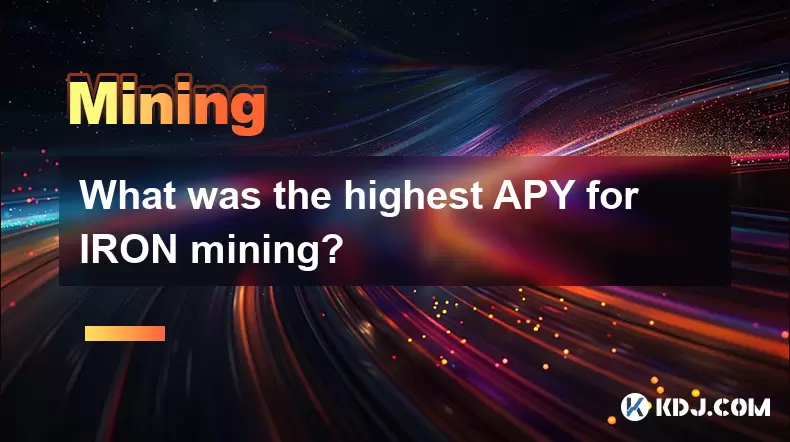
Was war die höchste APY für den Eisenabbau?
Jul 23,2025 at 05:14am
Verständnis des Eisen -Tokens und seines Bergbaubecheitungsmechanismus Das Eisen -Token ist ein Stablecoin, das im Iron Finance -Ökosystem arbeitet, h...

Was ist impermanenten Verlust in Eisenpools?
Jul 23,2025 at 09:00am
Verständnis impermanenten Verlust im Kontext von Eisenpools Impermanenter Verlust ist ein Phänomen, das die Liquiditätsanbieter auf dezentralen Finanz...
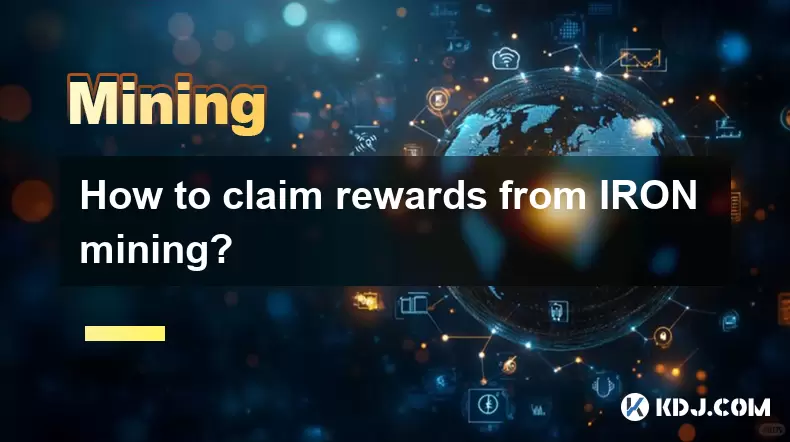
Wie kann man Belohnungen aus dem Eisenabbau beanspruchen?
Jul 23,2025 at 02:21pm
Verständnis von Eisenabbau- und Belohnungsmechanismen Die Eisenfinanzierung wurde als dezentrales Finanzprotokoll (DEFI) im Polygon- und Binance-Smart...
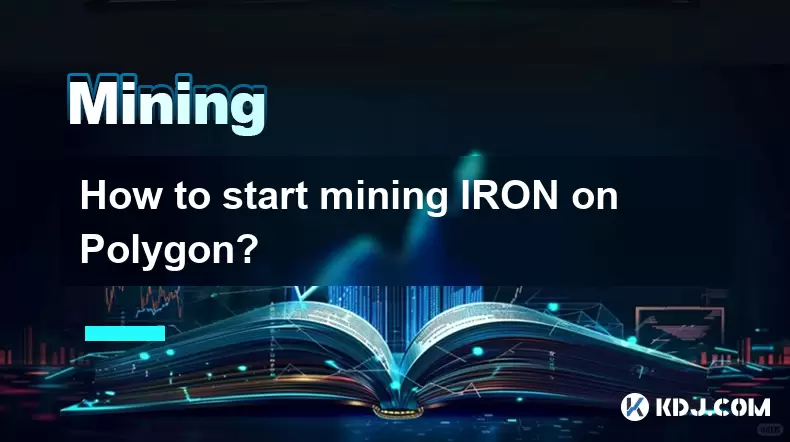
Wie beginne ich mit dem Bergbau auf Polygon?
Jul 23,2025 at 08:00pm
Eisen und seine Rolle auf Polygon verstehen Eisen ist ein dezentrales, algorithmisches Stablecoin, das für die Aufrechterhaltung eines 1: 1 -Stifts mi...
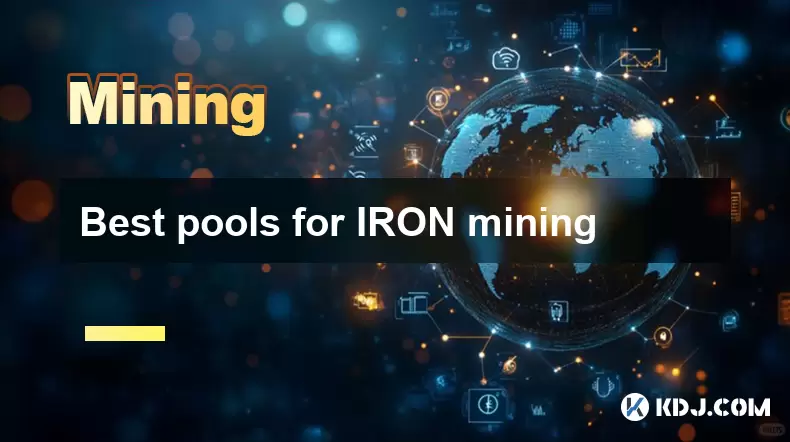
Beste Pools für den Eisenabbau
Jul 26,2025 at 03:56am
Verständnis des Eisenabbaus und dessen einzigartiger Mechanismus Iron (Eisenfinanzierung) war ein Dezentral-Finance-Projekt (DEFI), das darauf abzielt...
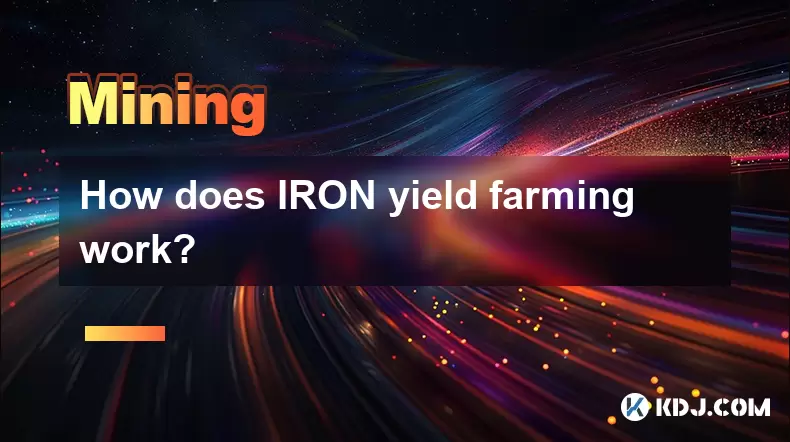
Wie funktioniert die Eisenbaumbau?
Jul 23,2025 at 10:14pm
Verständnis der Eisenertragslandwirtschaft und dessen Kernmechanismus Die Banal für die Eisenrendite ist eine dezentrale Finanzierungsstrategie (DEFI)...

Was war die höchste APY für den Eisenabbau?
Jul 23,2025 at 05:14am
Verständnis des Eisen -Tokens und seines Bergbaubecheitungsmechanismus Das Eisen -Token ist ein Stablecoin, das im Iron Finance -Ökosystem arbeitet, h...

Was ist impermanenten Verlust in Eisenpools?
Jul 23,2025 at 09:00am
Verständnis impermanenten Verlust im Kontext von Eisenpools Impermanenter Verlust ist ein Phänomen, das die Liquiditätsanbieter auf dezentralen Finanz...

Wie kann man Belohnungen aus dem Eisenabbau beanspruchen?
Jul 23,2025 at 02:21pm
Verständnis von Eisenabbau- und Belohnungsmechanismen Die Eisenfinanzierung wurde als dezentrales Finanzprotokoll (DEFI) im Polygon- und Binance-Smart...

Wie beginne ich mit dem Bergbau auf Polygon?
Jul 23,2025 at 08:00pm
Eisen und seine Rolle auf Polygon verstehen Eisen ist ein dezentrales, algorithmisches Stablecoin, das für die Aufrechterhaltung eines 1: 1 -Stifts mi...

Beste Pools für den Eisenabbau
Jul 26,2025 at 03:56am
Verständnis des Eisenabbaus und dessen einzigartiger Mechanismus Iron (Eisenfinanzierung) war ein Dezentral-Finance-Projekt (DEFI), das darauf abzielt...

Wie funktioniert die Eisenbaumbau?
Jul 23,2025 at 10:14pm
Verständnis der Eisenertragslandwirtschaft und dessen Kernmechanismus Die Banal für die Eisenrendite ist eine dezentrale Finanzierungsstrategie (DEFI)...
Alle Artikel ansehen





















